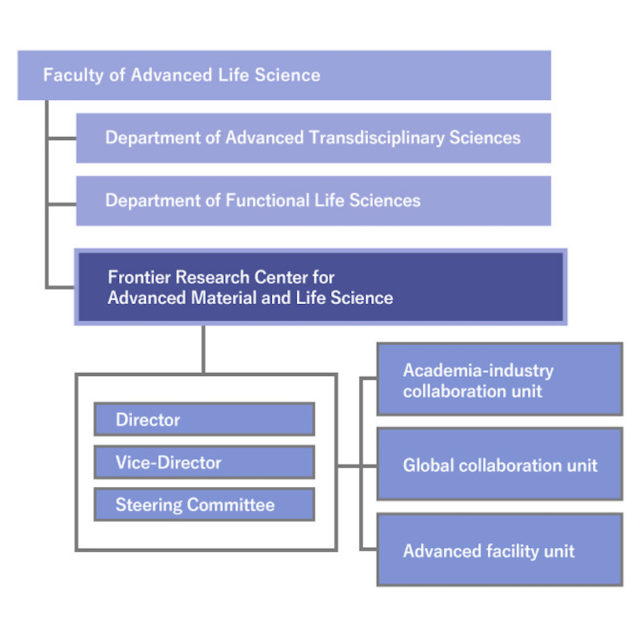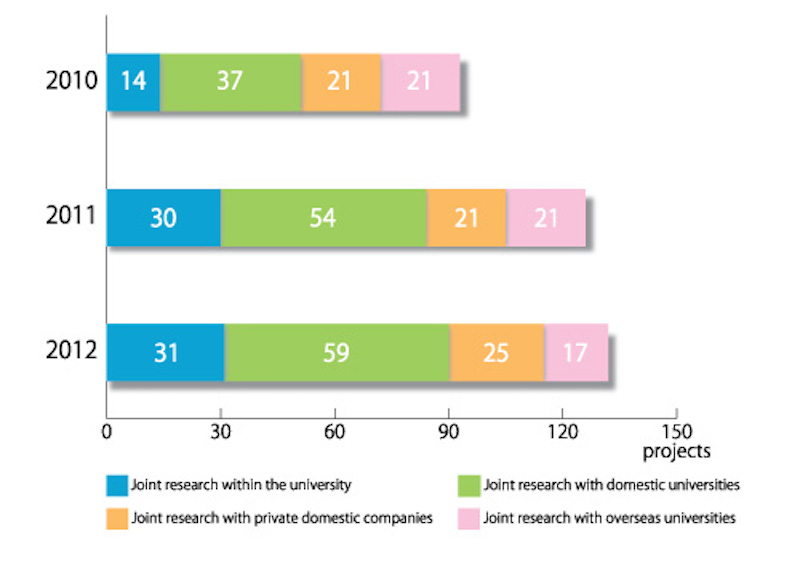Industry-academia collaboration
Frontier Research Center for Advanced Material and Life Science
The Frontier Research Center for for Advanced Material and Life Science was reorganized in 2016.
As the current century started, our country is asked to improve the sophistication of industrial structures. Technological innovation is essential to strengthen the national power of Japan and even to make the foundation of an abundant life for the future. Universities take responsibility for this new innovative technology development. Therefore, an action to create new industries is one of important factors to show the social significance of a university.
The former Frontier Research Center for Post-Genome Science and Technology accumulated collaborations on the basis of Life Science academia-industry networks, which is one of what society expects to the university. Furthermore, actions toward academia-industry collaborations will enhance the needs of global perspectives as well as positive actions in the country. In order to promote the global collaborations on which the Hokkaido University put much importance, it is imperative to create the international research center for it. Also, the role of large-sized equipment for leading-edge technology in life science has been very important. We will widely share the cutting-edge devices which were introduced for the past projects and impart the know-how so that life science research in the university can get higher level. Moreover, in order to carry on these projects continuously, it is essential to develop young researchers for the next generation, which needs to build a new organization.
The purpose for establishing the center is to develop the project creating the international collaborations research center as well as to accelerate the move of industry-academia collaborations by progressing the transdisciplinary research that was conducted in the former Frontier Research Center for Post-Genome Science and Technology. In particular, we reorganize a new organization by creating Academia-industry collaboration unit, Global collaboration unit, and Advanced facility collaboration unit. Academia-industry collaboration unit focus on a collaboration which related to life and material creation and medical and health care. Global collaboration unit implements a program “Global Station for Soft Matter (GI-CoRE) from 2016, and this program is the center to conduct international collaboration research. Advanced facility collaboration unit is intended to provide the shared equipment of Faculty of Advanced Life Science such as NMR, MS, and X rays, to accelerate practicability by animal experiments, and to work out the project for developing excellent human resources.

Joint research
As part of efforts to promote industry-academia collaboration, joint research is actively conducted (approximately 120 projects annually). Research partners include universities/colleges and private companies, and the number of projects conducted in collaboration with private enterprises shows a steady increase. The Faculty of Advanced Life Science completed successful negotiations in 2011 for Nitto Denko Corporation to establish its Hokkaido Laboratory at Hokkaido University. The university will take advantage of the industry-academia collaborative opportunities this has created by launching a new system based on a form of large-scale joint research in 2014.
In conjunction with this proactive work toward the development of joint research with private companies, the experimental animal facility located on the sixth floor of the Frontier Research Center for Post-genome Science and Technology (Frontier-PST) was also expanded to accelerate the practical application of research outcomes. The construction of the Center for Promotion of a Platform for Research on Biofunctional Molecules (PRBM; a new animal laboratory facility) adjacent to the Frontier-PST was completed in May 2011. It engages in research to develop new drugs using experimental animals and to formulate safe drugs, and also promotes joint industry-academia research with domestic/international organizations toward the creation of novel biofunctional food materials that will help to elucidate the diversity of intestinal/bowel functions on a nanometric scale.
